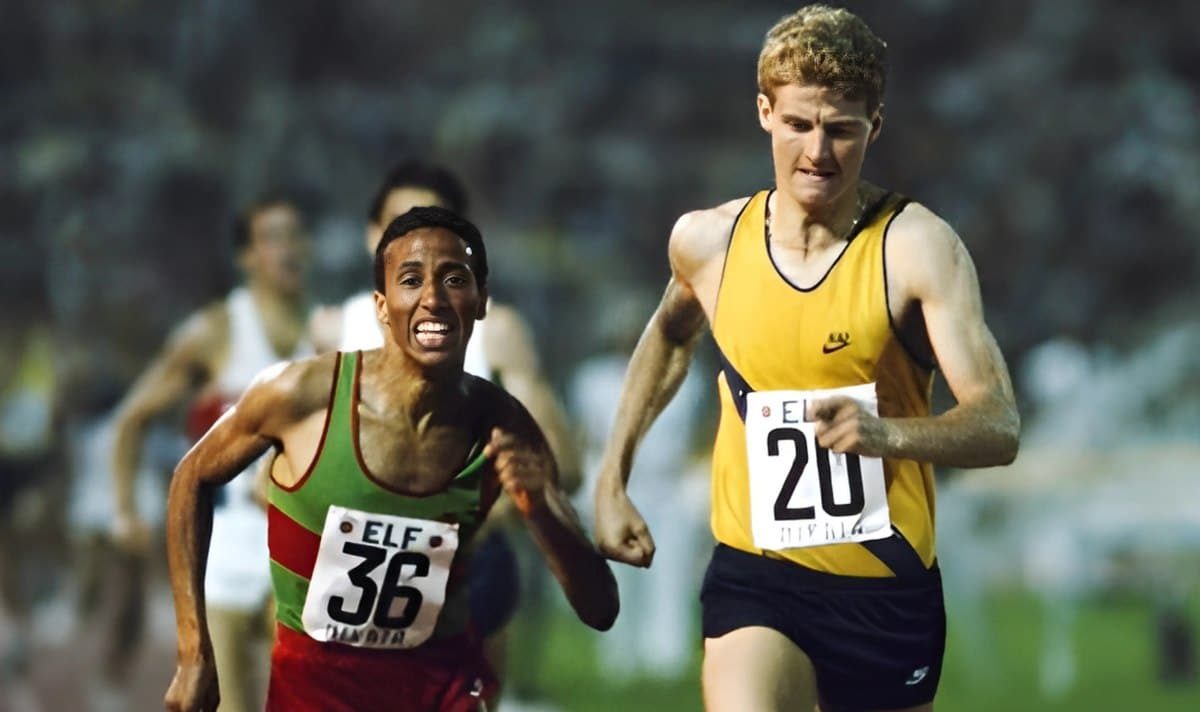It has been 40 years since British distance legend Steve Cram’s epic first sub-3.30 1500m run on the 16th of July 1985 in Nice, France. In what was one of the classic distance clashes of the era, Cram held off Moroccan Said Aouita to win in 3.29.67 to break countryman Steve Ovett’s two year-old record by over a second and break through this historic barrier.
Since Sir Roger Bannister’s first sub 4 minute mile in 1954, distance runners have continually pushed the limits of human endurance and after the first sub 3.40 in the 1500m ( or ‘metric mile’ as it became known) and the first sub 3.50 mile, the race to the first sub 3.30 became the big goal for the world’s top milers.
Stanislav Jungwirth (CZE) broke 3.40 (3.38.1) for 1500m in 1957 and eventual Olympic champion Sir John Walker (NZL) crashed through the 3.50 mile barrier in 1975 with his 3.49.4 in Sweden and the possibility of a 3.30 1500m came into focus in the late ’60s, when Jim Ryun (USA) ran 3.33.1 to take 2.5 seconds off Aussie Herb Elliott’s record in 1967. Filbert Bayi (TAN) brought the record down to 3.32.16 in the classic match up with Walker in the Christchurch Commonwealth Games 1500m in 1974, with Walker just a metre or so behind.
A few years later, two Englishmen, Sebastian Coe and Steve Ovett began their frequent assaults on the world’s middle distance standards with alarmingly regular success. They broke records from 800m to 2 miles and in the 1500m and mile alone, they broke or equalled world records on 9 occasions between 1979 to 1983. Coe broke Bayi’s record in 1979 with 3.32.03 and when Ovett ran 3.30.77 on a windswept track in Rieti, Italy in September 1983, it was the closest anyone had come to the 3.30 mark.
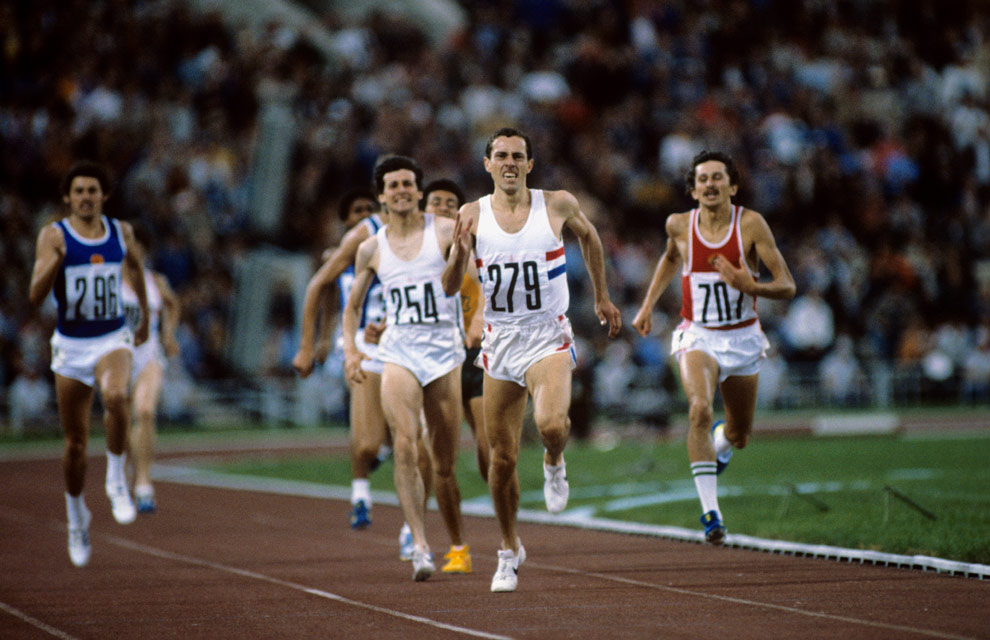
The LA Olympics in 1984 meant that medals rather than records were the focus for Coe and Ovett, so record attempts would be on the backburner for a while. When Coe and Ovett experienced a few setbacks in 1982 and ’83, a couple of younger athletes had emerged on the scene.
The ‘Jarrow Arrow’ Steve Cram had dominated the 1500m finals in the 1982 Commonwealth Games and European Championships and 1983 World Championships, where Coe and Ovett were either out through illness or injury, or struggling with poor form. Coming off injuries himself, Cram still appeared to be the favourite for Olympic gold in LA. An inspired comeback performance from Coe, however, meant that Cram’s dream of Olympic glory would have to wait a few years. Coe was dominant in the 1500m after winning silver in the 800m. Ovett had experienced breathing difficulties during races and had perhaps not adequately recovered from a bout of bronchitis. He made the finals of the 800m and 1500m, but finished last in the 800m and dropped out of the 1500m with 350m to go.
Cram’s build up for the 1985 season began well, with an impressive win against a top field in the Northern Counties cross country. There were also some quick road races and fast splits running for Jarrow in Northern England road relay championships. In the months before his big races of the ’85 season, the 24 year-old suffered a recurrence of the calf injury that had plagued him the previous year and he lost several days’ training at a crucial time of the year. He recovered well and was running well in June. He narrowly lost to both Coe and up-and-coming Scotsman Tom McKean in a couple of 800m races, but it was his 1500m in Oslo a few weeks out from Nice which gave many observers an indication that something special was on the cards for the 1985 season. Cram ran away from a world class field, taking the lead with almost two laps to go and running away with the race, winning comfortably by about 20m from Steve Scott (USA) running the third fastest of all time (3.31.34). Cram looked full of running and didn’t know what he had run at the finish as he hadn’t paid attention to his splits. Cram had assumed he’d run about 3.34, until he saw the time on the scoreboard. Cram’s final hit out before Nice was a 1.47 800m in London a few days before the race. He was primed for something big.
Said Aouita was now 25 and had emerged as another contender for the crown of world’s top miler with his breakthrough performance in the 1983 World Championships 1500m, where he won a bronze behind Cram and Scott and in front of Ovett. Aouita had also run world class times over 800m and 1500m early in the season.
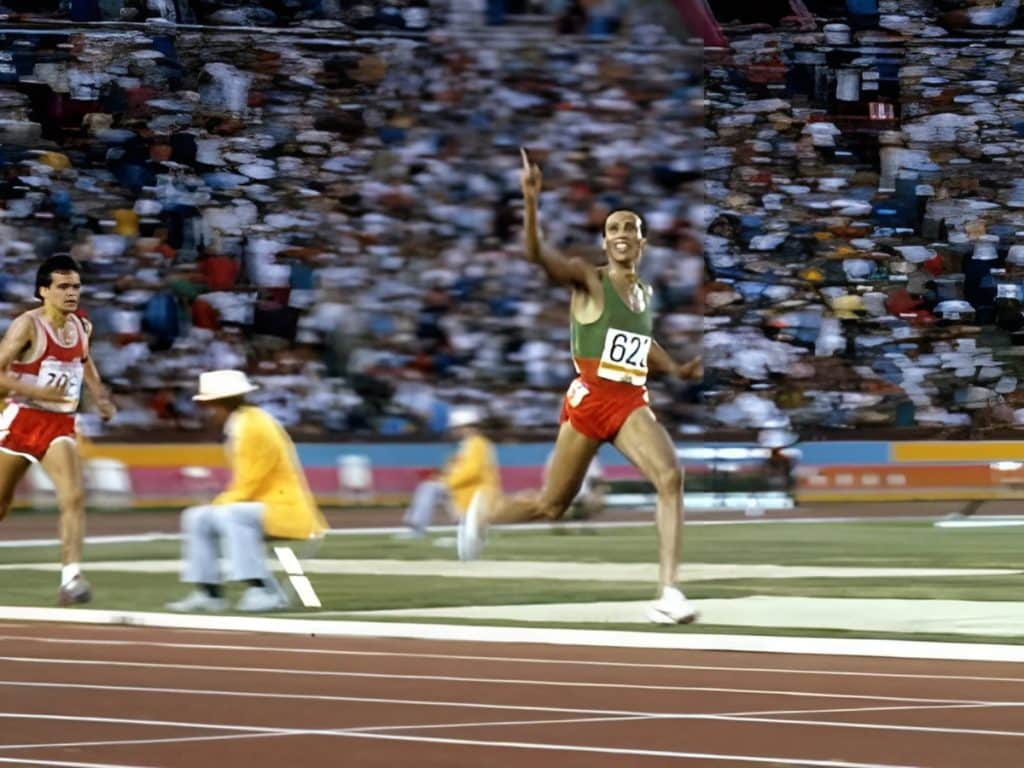
In 1984, the multi-talented Aouita had moved up to the 5000m, running within 4.37 of Dave Moorcroft’s world record (13.04.78) and ran a world-leading 3.31.54 in the 1500m. Aouita opted to run the 5000m in the LA Olympics, winning gold comfortably in a new Olympic record (13.05.59). Aouita stirred controversy, claiming he would have beaten Coe in the 1500m, though given the manner of Coe’s win, it was unlikely anyone could have matched Coe’s blazing kick over the final 100m.
Early in the 1985 season, Aouita posted a series of fast times over distances from 800m to 5000m. He won a 5000m race in 13.04.52 in Oslo at the end of June (the same meeting as Cram’s 3.31 1500m), a marginal improvement on his best and the second fastest of all time and there was a fast 4.54.98 for 2000m in Madrid just before that. His final tune up before Nice was a 1.45.81 800m in Italy about 10 days before the race.
The race in Nice was a promoter’s dream: The World 1500m champion up against the Olympic 5000m champion. Aouita and Cram would line up against a top-tier field, including World Championship silver medallist Scott and top Spaniard Jose Luis Gonzalez. Both Scott and Gonzalez were looking to atone for the previous season’s poor form. Scott, now 29, was disappointed with LA, where he had led for a lap or so of the 1500m final, yet had faded out of medal contention in the last 600m. Gonzalez had promised much yet delivered little for a man of his immense talent and had to play second fiddle in Spanish middle distance running behind Olympic bronze winner Jose Abascal. Gonzalez had a solid pre-season preparation, was injury-free, and it was now the 27 year-old Gonzalez’s turn to shine.
Another superstar making the trip to the French Riviera was Olympic 800m champion Joaquim Cruz (BRA). After dominating the 800m the previous season and also just missing Coe’s world record, Cruz was hoping to expand his repertoire and was up to the challenge of taking on the world’s best milers. Though focused on the 800m, 22 year-old Cruz had dabbled in the 1500m with some success, winning NCAA races with relative ease and posting some respectable times in the 3.36-37 range. Nice, however, would be a different ball game for the big Brazilian.
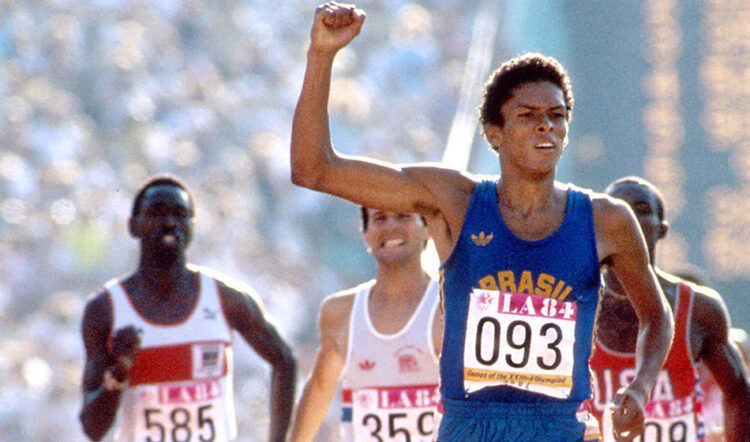
There was also Stefano Mei (ITA) in the race as well as Chuck Aragon (USA) and a couple of locals Thiebaut and Bouchard. Pacemaking duties would be handled by Senegalese athlete Babacar Niang and Olympic finalist Omar Khalifa (SUD). Coe and Ovett were both focusing on other races and wouldn’t make the trip to France.
Niang and Khalifa took on the pace early and took the field through in a little over 55 seconds with Cram just behind in around 55.4. Cruz was tracking Cram and Aouita was content to sit back behind Gonzalez and bide his time. The pace lagged a little and Niang went through 800m in 1.53.4 (Cram 1.53.8).
Niang dropped back at the 800m mark and Khalifa took over. Cram sat just behind Khalifa and looked comfortable. Coming into the final lap, Gonzalez, Scott and Aouita began to move up and everyone was gathering for a big final lap. As Scott moved up to Aouita into fifth at 1080m and it was at this point that Cruz started to struggle.
At the bell, Cram made a bold move, deciding to make a long run for home. He kicked hard with 370m left and immediately opened a gap. With a split of 2.49.6 at 1200m, he was outside world record pace, but could get the record with a fast finish.
Cram strode majestically down the back straight and Aouita had moved past Gonzalez and was giving chase to Cram, but was still a good 5 or 6 metres down on the Englishman, who flowed into the final bend with 200m left, still full of running.
With 120m left Aouita was now flat out and gaining slightly. Into the straight, Cram showed the first signs of stress and as Aouita made up ground, Cram’s stride shortened noticeably and with 60m left, Aouita had closed within a couple of metres, his head moving side-to-side.
Cram was holding it together, still a metre in front with 20m left, though he sensed someone on his right. He drove hard for the line and dipped at the line, just getting the win, finishing in 3.29.67, breaking the 3.30 barrier for the first time in history. Aouita also broke 3.30, finishing second in 3.29.71. The pair embraced and Cram took a well deserved victory lap. Cram had covered the last lap in 53.4 to Aouita’s 52.9. Cram, of course, was ecstatic with his performance and expressed his gratitude to his family and his coach Jimmy Hedley.
Behind them, Gonzalez ran a new Spanish record, finishing third in 3.30.92. Scott was 4th in a PB of 3.31.76. Cruz faded badly over the final lap, finishing 7th behind Thiebaut and Bouchard.
Cram’s performance in Nice was the catalyst for one of the most spectacularly successful seasons of any middle distance runner in history. Cram went on a tear throughout the 1985 European track season. He broke Coe’s mile record in Oslo by a second (3.46.32) after unleashing a 25.4 final 200m. He finished over a second in front of Gonzalez (who ran a Spanish record of 3.47.79 which lasted 38 years). Coe was third, almost three seconds behind his countryman. Cram’s record survived for 8 years until beaten by Noureddine Morceli in Rieti 1993 and was the British record until Josh Kerr beat it when defeating Jakob Ingebrigtsen in the Pre Classic last year. About a week later, he also broke John Walker’s 9 year-old 2000m record by just 0.13 (4.51.39) in Budapest. It was a remarkably even paced race (2.25.6 @ 1000m) though he was alone for much of the second kilometre and really had to work hard over the final lap.
Days later at the Kodak Classic at the Gateshead Stadium, Cram had arranged with organisers to stage a 1000m race, in which he would make an attempt on Coe’s world record. It was a little windy, though Cram was confident. The early pace was near perfect (1.44.94 @ 800m) but Cram fell short by 0.7, finishing in 2.12.88, the second fastest of all time.
After an easy win at the European Cup Final a week later, Cram went to Zurich to match up against Olympic champion Cruz and a field stacked with the greatest 800m runners of the era. Brazilian Guimares led compatriots Cruz and Barbosa through 400m (50.61) with Cram hanging off the pace (51.2). He followed Guimares and Cruz up the back straight and tracked Cruz on the final curve, kicking past Cruz in the straight to victory. He ran 1.42.88, the fifth fastest in history. It was an exceptional year for Cram, who was narrowly beaten for British Sportsman of the Year by boxer Barry McGuigan.
The following year was another great one for Cram, as he won a Commonwealth Games 800m/1500m double and retained his European 1500m title, after being beaten into third in the 800m behind Coe and McKean. He also won the Dream Mile in Oslo, ran a 3.30.15 1500m in Brussels and a world-leading 1.43.19 800m in Rieti.
In 1987, he experienced mixed results. He lost a European Cup 1500m to Gonzalez, won the Dream Mile again and ran 3.31.43 to win the Zurich 1500m. His World Championship defence in Rome was a disaster. He took on new young gun Abdi Bile (SOM), Gonzalez, Scott, Jens Peter Herold (GDR), Aussie Mike Hillardt, Joseph Chesire (KEN) and Jim Spivey (USA) and after a slow opening 2 laps, Cram took over, running a hard third lap, attempting to run the finish out of Bile. His plan backfired and though still in front with 150m, he faded to 8th.

Cram’s 1988 campaign was going incredibly well with a string of pre-Olympic performances that were amongst his best ever. By September, he had perhaps over-raced. He sustained another calf injury in Rieti during a 1000m race and lost crucial pre-Olympic training and was off his game coming into the Olympics in Seoul in late September. He bombed out of the 800m in the second round and looked flat in the 1500m final, struggling home for 4th, behind surprise winner Peter Rono (KEN), countryman Peter Elliott and Jens-Peter Herold (GDR).
Cram continued to struggle with injury in the coming years, though he did run some fast times and win some races and road miles. He missed the 1992 Olympics, competed unsuccessfully in the 1993 World Championships and retired in 1994.
Aouita followed Nice with a world record in Oslo. He outkicked Sydney Maree (USA) and scraped under Dave Moorcroft’s world 5000m record (13.00.40). He went on to narrowly miss Cram’s mile record (3.46.92) in Zurich and two days later in Berlin, he beat the 1500m world record, finishing just inside Cram’s record (3.29.46). He then ran the third fastest 3000m (7.32.94) in history.
In subsequent years, Aouita established himself as one of the greatest and most versatile distance runners of all time. He ran a range of world class times in distances from 800m and 10,000m almost unparalleled in the history of the sport.
Between 1985 and 1989 he broke 6 world records (3.29.46 1500m, 4.50.81 2000m, 7.29.45 3000m, 8.13.45 2 miles, 13.00.40 5000m & 12.58.39 5000m). He ran 1.43.86 for 800m before the 1988 Olympic Games, beating Olympic Champion Cruz and ran one of the fastest 10,000m of all time (27.26.11) when he beat a world class field in Oslo.
In 1987 Aouita dominated world middle distance running like almost no other athlete. He ran multiple world records and won the 1987 World Championships 5000m in Rome, kicking away in the last 200m.
He had a successful year in 1988, but, like Cram, came unstuck at Seoul. He decided to run the 800m and 1500m and skip the 5000m. He was carrying a minor hamstring injury coming into the Games, which was exacerbated by his 800m campaign. He ran well, just getting ahead of Peter Elliott in the straight to grab the bronze medal (1.44.06). No other athlete before or since has won Olympic medals in the 800m and 5000m. He ran the opening round of the 1500m, but pulled out of his semi final.
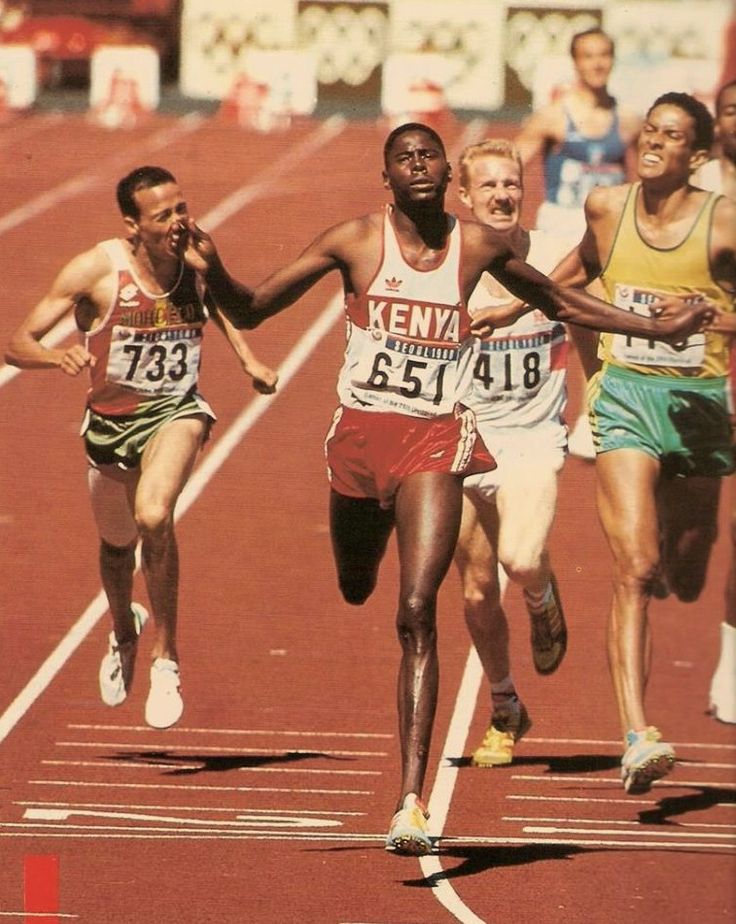
He recovered and had a successful 1989. He easily won the World Indoor 3000m title, the World Cup 5000m and smashed the world 3000m record in Cologne (7.29.45).
It was a less successful year in 1990. He won a few races, but began to struggle with injury again. He was near the back of the field in the New York 5th Avenue Mile and was outkicked by Gary Staines in the 3000m at the new Don Valley Stadium in Sheffield.
He had prepared well in the off season in 1990/91 and he hoped to be able to challenge new young guns Noureddine Morceli (ALG) and Wilfred Kirochi (KEN) in Tokyo at the 1991 World Championships, but was outclassed and trailed off and finished 11th.
Aouita came back with a world record in the indoor 3000m the following year, but the record was later disallowed because the video revealed that Aouita had run a substantial distance inside the inside lane on the bends. He won a few races early in the season, but was injured in June and missed his third Olympics.
His career tailed off and he eventually retired in 1995. He went into coaching and was eventually appointed as National Distance Coach for Athletics Australia.
Aouita clashed with other coaches and he left in controversial circumstances, when he allegedly suggested athletes try performance enhancing drugs. He has been a consultant and technical manager in Morocco and he established a sports clothing company among other business interests. He and his family move between Florida and Morocco. Aouita’s daughter Xena has established a career as a singer and he is reportedly very supportive of her career.
After his competitive career ended, Cram continued his involvement in the sport. He continued to run and ran a sub 2.35 marathon in the 1999 London event – while broadcasting.
He has been a successful coach, with Laura Weightman being perhaps his most successful athlete. He is also the Chancellor of his alma mater Sunderland University.
Cram, of course, also carved out a successful career in broadcasting, working for the BBC with his mentor and fellow Olympian Brendan Foster. The two Geordie icons worked together for two decades until Foster’s retirement in 2017. In recent years, Cram has worked with World Cross Country and European Championship medallist Tim Hutchings and the two are probably the best-known and well-respected athletics commentary team in the English speaking world.
Cram, though divorced from Karen, has two healthy kids who are now in their thirties. He has established a long-term relationship with former athlete Alison Curbishley – also now in broadcasting. His career was a long successful one and he was, along with countrymen Steve Ovett, Seb Coe, Dave Moorcroft and Peter Elliott, part of the most consistently successful periods in middle distance running for a single nation. Between them, they were, during the late ’70s to the late ’80’s, responsible for 23 world records, 7 Olympic medals, 2 world championship medals, 11 European medals and 8 Commonwealth medals.
Though he won titles and ran many fast times over his career, the first sub 3.30 was a stand out historical achievement for Cram and the likes of fellow World Champions Jake Wightman and Josh Kerr – among many other contemporary athletes – point to Cram as a key inspirational figure in their careers.
The author wishes to thank The BBC, The Guardian, Runners World, Athletics Today, The LA Times & Let’sRun.com



